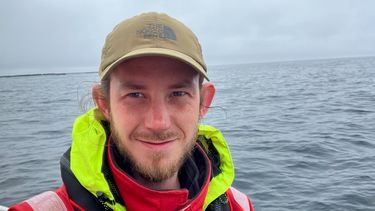Case study - Josh

Who are you and what is your job title and organisation?
Josh Parker, Marine Ecology Specialist for Natural England.
What does your job involve?
I have lots of different aspects to my role. Currently, half of my time is spent working on marine condition assessments for marine protected areas (MPAs). Condition assessments use best available evidence to evaluate the health of the protected features and report what condition they are in. This is important to inform reporting, monitoring and management of our MPAs. I write method documents, develop guidance and deliver internal training.
In addition, I provide support for Natural England’s Dive Team, including planning surveys, assisting on surveys, undertaking data processing, analysis and reporting of results. I also work with various area teams on marine monitoring programmes across the North Sea and lead innovative research projects, eg using eDNA to inform blue carbon origin assessments. I am also working on a project to notify a new SSSI to protect marine habitats.
How did you find your role and why did you decide to apply?
I have been with Natural England for 7 and a half years within various different roles, including marine advisor, marine lead advisor and senior advisor for the offshore wind programme. I decided to apply to my current role because of the opportunities to get outside on surveys and to see the natural environment I work to protect. Getting paid to do intertidal surveys or go on a survey boat is too good an opportunity to turn down. Natural England jobs are advertised on the Civil Service Jobs website.
How does your role enable you to have a positive impact on the world by supporting the United Nations’ Sustainable Development Goals?
A healthy and thriving global ocean underpins almost every UN SDG – there is no green without blue. We need a healthy ocean, and the ecosystem services it provides, to deliver each of the UN’s goals, but particularly SDG14 – Life Below Water.
I am helping to work towards this goal by delivering monitoring programmes to understand the state of our seas, collect evidence and to focus management. Marine condition assessments are a vital programme to track our progress to legally binding goals and targets (such as the Environmental Targets (Marine Protected Areas) Regulations, 2023) and to focus attention on MPAs which require further management. We need to understand how our seas are doing in order to take action. In addition, notifying new protected areas is another way of safeguarding our natural environment and allowing nature recovery to take place.
In my previous role as a marine senior advisor for the offshore wind programme, I worked to identify and implement strategic solutions for facilitating the sustainable development of low impact offshore wind, eg through the production of best practice advice documents and engagement across the sector. This was actively contributing towards SDG13: Climate Action and SDG7: Affordable and Clean Energy.
What do you enjoy about your role?
I most enjoy knowing that I am doing my bit to tackle the biodiversity crisis and to restore the health of our seas. I also particularly enjoy getting outside – going on a dive boat for a week or undertaking intertidal surveys are real perks of the job.
Another key part of my job I really enjoy is working with my colleagues. No-one works within Natural England for the power or (unfortunately) the money, but we have an extremely dedicated, passionate and lovely staff base. I highly value working with my colleagues, and I consider it to be a major benefit of my role. The work-life balance is also very good at Natural England with flexi-leave, flexible working arrangements and decent annual leave.
What’s the most challenging part of your role?
Natural England (and all public bodies) can be process heavy and have some degree of bureaucracy. I believe this is broadly necessary as the Government’s Statutory Conservation Advisor needs to be transparent, accountable, objective and evidence led, but it can be a burden at times.
What skills/experience are useful in your current role?
Transferable skills are very important, such as being able to communicate well, analyse information, think constructively and work effectively. A strong understanding of marine ecology and processes are important for my current role as a specialist. However, many different skills or knowledge bases can be learnt on the job.
What advice would you give to students who are considering a positive impact career?
For me, working to improve the natural environment, and therefore people’s lives, drives me and gives me purpose. I am proud to be doing my bit to help fight the biodiversity and climate crises.
I would suggest looking for conservation careers outside the usual suspects. I studied at the University of Sheffield and my view of possible employers when I graduated was mostly limited to the major eNGOs (RSPB, WT, NT etc.), but there are so many more opportunities to get involved with conservation, whether within the Government sphere, NGO/charity sector, science, policy or with responsible developers.
I may be biased, but I would strongly recommend working in the marine conservation sphere!
